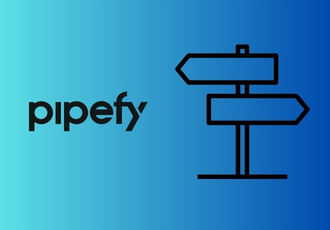The financial services industry is experiencing unprecedented disruption, fueled by technological advancements, new business models, and artificial intelligence (AI). The shift to mobile banking, the emergence of new fintech challengers, and rapid advances in generative AI have all intensified competition within the industry. EY reports that AI-powered finance automation is imperative for organizations to compete in this hyper-competitive industry.
In this article, I'll discuss why finance automation is imperative, examine the benefits of AI-powered digital process automation, and provide real-world examples of organizations streamlining processes to save time, reduce errors, and support compliance with real-time insights and data security.
Let's get started.
What is finance automation?

Finance automation is the method to automate repetitive manual tasks to increase productivity, deliver differentiating customer service, and ensure compliance with enhanced data insights and analytics.
At the heart of finance automation is the use of technology to accelerate the completion of tasks, shifting the labor burden from humans to machines. The automation of tasks frees up time for teams to focus on more strategic initiatives, reducing admin time and driving cost savings.
In 2025, Deloitte predicts that finance automation will target end-to-end processes affecting multiple business areas, not siloed activities. This shift to company-wide automation will accelerate the pace of digitalization and place process automation platforms firmly within the digital transformation tech stack of financial services organizations looking to drive operational excellence.
Which finance process should be automated? (Examples)
-
Compliance: The financial services industry is one of the most highly regulated sectors across the globe. Finance process automation can help organizations meet their regulatory requirements by digitalizing key processes to create a digital audit trail, electronic records, and secure personal data. Finance automation enables organizations to design and build processes that can be fully certified to meet regulatory requirements on electronic records e.g. ISO 9001 and 21 CFR Part 11.
With the introduction of DORA (Digital Operational Resilience Act) as a European Union legislation in 2025, the safeguarding of data for banks, insurance companies, and investment firms will become even more critical. DORA covers the following key frameworks:- ICT risk management
- ICT third-party risk management
- ICT-related incidents
- Digital operational resilience testing
- Information sharing
- Oversight framework for critical ICT third-party providers
A digital process automation platform, such as FlowForma, will ensure financial services organizations manage IT risk, secure data, and streamline IT incident management processes.
-
Client engagement: Client engagement is the cornerstone of financial services organizations. Many organizations continue to rely on manual methods for client engagement processes, resulting in limited operational improvements in this area. Automating the client engagement process can streamline, add structure, and improve the visibility of the process.
With finance automation, organizations can quickly build out a digital client engagement workflow, securely capture important information, generate engagement letters, and store key documentation in relevant folders for easy access. Automating the client engagement process will improve productivity, enhance customer satisfaction, and improve customer data security.
-
Policy management: Policy management is a time-consuming but vital task in the financial services industry. Managing policies effectively is critical for organizations to meet their legal obligations. By digitalizing manual processes organizations can support their compliance goals, get real-time access to policies, and save time and reduce costs by digitizing cumbersome manual policy management tasks.
-
Onboarding: Customer onboarding is a central task for a successful finance process automation strategy. Slow onboarding can lead to poor customer satisfaction. Organizations automating their onboarding can accelerate the completion of tasks associated with the process. This streamlined and automated experience drives productivity gains, improves customer experience, and accelerates digital transformation.
This is just a flavor of some of the finance processes that can be automated with FlowForma Process Automation.
In this video, we discuss more detailed use cases that can be automated.
Some more examples can be found below:

How finance automation works
In its essence, finance automation refers to the replacement of manual repetitive tasks with streamlined, automated processes. Time-intensive tasks such as onboarding, previously managed through spreadsheets or email, are transformed into streamlined digital processes.
AI advancements in platforms, such as FlowForma Process Automation have seen the speed of building digital processes increase dramatically. Let's discuss how one of the newest innovations, FlowForma Copilot helps financial services organizations automate processes faster than ever before.
It can take valuable time for Flow Builders in financial service organizations to fully understand their organization's business processes. This usually means spending time with process owners to gather enough knowledge before automation can begin.
24/7 Process Expert
 But imagine if, as a Flow Builder, you had a process expert available 24/7 with detailed knowledge of thousands of business processes. An expert who could help you tailor processes to your exact needs—quickly, simply, and intuitively.
But imagine if, as a Flow Builder, you had a process expert available 24/7 with detailed knowledge of thousands of business processes. An expert who could help you tailor processes to your exact needs—quickly, simply, and intuitively.
That's exactly what FlowForma CoPilot offers Flow Builders. Powered by generative AI, Copilot can create working processes in seconds, which can then be fine-tuned and customized through simple, natural language commands.
You can share these processes with stakeholders to get their input and approval and roll them out quickly to meet your automation goals.
This advancement in generative AI technology delivers greater time savings, productivity improvements, and cost reductions for organizations.
AI-powered platforms such as FlowForma Copilot, support the rapid automation of financial services processes. In this interactive demo, Copilot creates a claims management process with a simple text prompt.
Finance Automation: Aon Use Case

A practical example of finance automation in action is with one of our clients, Aon Ireland.
One of the world’s largest insurance brokers, Aon has a strong Irish presence with five sites employing around 700 people. Similar to many organizations, it is always looking at new ways to improve processes, drive productivity, and increase efficiencies. However many organizations still rely on manual methods for client engagement processes, missing valuable opportunities for operational efficiency.
Aon sought a platform that could quickly and easily streamline workflows by replacing outdated, labor-intensive processes with automated solutions that save time and reduce costs.
Each business unit had its own way of managing information, often using Excel spreadsheets and paper records, which conflicted with the IT department’s digital transformation goals.
They needed a centralized, automated data repository to enhance transparency, support compliance, and streamline auditability—especially crucial for an insurance company.
After attending a FlowForma training session to explore advanced features, one user noted that the product’s intuitive design made training nearly unnecessary.
He independently developed his first process in less than a day, starting with an HR Onboarding/Offboarding system to secure access rights for new and departing employees. This automated workflow now ensures confidential information access is revoked for leavers, enhancing security.
Another automated process handles GDPR requests, accurately tracking and recording personal data inquiries. With up-to-date data readily accessible in a central repository, compliance and transparency are enhanced, avoiding potential regulatory issues.
Additional workflows include an Insurer Amendments process that lets stakeholders approve or reject requests and an Insurance Vetting System for contractors, a game-changer for reducing liability risks associated with onsite work.
Other automated workflows include Internal Transfers for streamlining application access for employee role changes and a Complaints process for logging issues like health and safety concerns. The IT team also developed a workflow to track infrastructure and application outages.
FlowForma Process Automation is now embedded in Aon’s Irish IT department’s digital transformation, and other business areas have proactively adopted the platform to increase efficiency, save time, and maintain compliance.
For example, the Insurance Vetting System transformed a cumbersome process that previously depended on calls and paperwork into a streamlined, instant validation system for contractors’ site coverage.
Importantly, FlowForma’s no code platform empowers users from non-technical backgrounds to create advanced processes. One non-IT colleague developed an intricate workflow independently, and more managers are expected to do the same.
 As Robbie Molloy, Aon’s Product Manager, explained,
As Robbie Molloy, Aon’s Product Manager, explained,
“We can now build a fully functional flow in less than a day, which is far preferable to a six-month project. FlowForma Process Automation offers a level of customization that’s been a game-changer, making our work—and the business’s work—easier and more efficient.”
FlowForma’s iterative, collaborative development approach allows users to see prototypes, provide feedback, and refine processes. This approach has proven effective in aligning IT goals with business needs, accelerating Aon’s digital agenda, and enhancing productivity across the organization.
Finance automation benefits
-
Productivity: Automating manual processes drives significant productivity improvements. Time spent on inefficient spreadsheets or trying to find correspondence in an email chain is replaced by seamless automated processes that save time. Organizations can direct time savings to work on more value-added tasks and strategic business initiatives.
Learn how FlowForma customer Grant Thornton has improved productivity by 60% with process automation.
-
Compliance: In a highly regulated industry, compliance is a must for organizations. Process automation supports compliance in financial services by providing an audit trail, managing sensitive documents, and standardizing data to reduce errors.
-
Cost savings: Process automation enables more efficient and productive workflows. By boosting productivity, organizations can achieve significant cost savings through the adoption of automated processes.
-
Digital transformation: Today’s tech-savvy workforce is embracing digital platforms more than ever before. One of the subtle benefits of process automation is its ability to cultivate a digital mindset throughout the organization. As the adoption of digital tools becomes a critical success factor, this digital mindset will drive further digital transformation.
-
Data insights: Process automation creates a comprehensive data record for each completed task, offering real-time access to process data and enabling more informed decision-making.
-
Integrations: Deploying a process automation platform with advanced integration capabilities can have significant benefits. Some key benefits include increased accuracy, as master data ensures consistency and smooth data transfers; increased speed, as third-party systems can be updated instantly; reduced costs, by minimizing errors and pre-populating data; and improved security.
Finance automation challenges
-
Data quality and security: Financial services organizations manage vast amounts of internal and external data. It's therefore imperative that data is managed sensitively and securely. Managing data via spreadsheets or legacy technologies can lead to data inconsistencies or even errors. Process automation supports organizations to manage their data securely, minimizes duplication and errors, and enhances data quality.
-
Legacy systems: Financial services organizations using legacy technologies can be faced with inefficiencies, data inconsistencies, and performance challenges leading to siloed data. By introducing a modern digital process automation platform organizations can improve data quality, achieve productivity gains, and drive digital transformation.
-
Adoption: Technology adoption is one of the key challenges faced by organizations in the digital age. If users aren’t embracing the technology, it becomes challenging for tech leaders to capture value, demonstrate ROI, and drive the success of the digital process automation strategy.
-
Integrations: Financial services organizations with multiple platforms can face integration challenges. Introducing a digital platform can add significant value by exchanging data and documents between third-party systems.
Finance automation best practices

-
Goals setting: Have a clear goal for your finance automation strategy with tangible KPIs. Are you looking to improve productivity, meet compliance targets, or have digital transformation goals?
-
Start small and scale: We recommend starting with a process that you can easily automate, prove value, get buy-in, and then scale your process automation.
-
Centre of Operational Excellence: Establish a center of operational excellence to drive your finance automation project forward. Stakeholders involved in the project meet regularly to drive the project, ensure alignment, and get the most value out of your process automation platform.
-
Training: Adoption is key to the success of every finance automation strategy. We recommend training to ensure that users have the required level of skills to operate the process automation platform, drive adoption, and enhance value.
-
Champions: Identify champions within your organization to drive your digital agenda. This will encourage technology adoption and ensure the value of your finance automation platform is maximized.
-
Return on investment (ROI): Technology leaders are under pressure to showcase the value of their technology investment. Demonstrating ROI from finance automation solutions is critical to get business buy-in. ROI models grounded in business insights give leaders the confidence that the finance automation platform is generating real value for the organization.
- Data foundation: With reliable data driving the success of every AI strategy, process automation can serve as a strong foundation. We recommend using a process automation platform to gather data across your organization, creating a base for scalable data models to support your AI initiatives.
Conclusion
Finance automation is imperative for organizations to compete and win in today's hyper-competitive marketplace. Seizing the opportunity of AI-powered process automation can be transformative for organizations looking to drive productivity, reduce cost, and deliver optimal customer experiences.
With compliance a key business priority in 2025, financial services organizations can get ahead of their compliance goals by deploying a robust digital process automation platform.
As a leader in AI-driven process automation, FlowForma is uniquely positioned to support financial services organizations on their journey to operational excellence and compliance.
Connect with our team today to explore how AI-powered process automation can elevate your organization.
 By
By 




